
Chad Ywayan
Chad Ywayan is a graduating Bachelor of Business Administration with double concentrations in Marketing and Human Resource Management. Currently working in luxury hospitality at Fairmont Waterfront, his goals for this article, degree, and future career are to demonstrate his business acumen gained from lessons and experiences in the classroom and insight obtained from the workplace, and combine them into a powerful foundation that will set him up for success in his intended career as a renowned leader in the luxury hospitality industry.
With the explosive rise in artificial intelligence (AI)’s ubiquity since the end of 2022, the inevitable integration of this technology into society has always been on my mind. Specifically, the intersection of AI and luxury hospitality operations piqued my interest, along with the near-endless possibilities AI technology could be utilized to augment both the guest and staff experience. Luxury hotels, leading the narrative of customer satisfaction in the hospitality industry, are now facing the imperative task of integrating AI into their operations. This need to keep up with technological advancement, innovation, and set new standards in the industry, significantly elevates guest experiences and workflows.
Simultaneously, in the dynamic world of luxury hospitality and food services, the integration of advanced technologies like artificial intelligence (AI) is revolutionizing various aspects of the industry. AI’s influence is not only enhancing the guest experience in luxury hotels but is also set to transform talent acquisition and management. This exploration delves into the multifaceted role of AI in these sectors, scrutinizing its potential and limitations in redefining luxury hospitality, and reshaping human resources processes. This viewpoint is enriched by my dual perspective as a graduating CapU business student with concentrations in Human Resource Management and Marketing, and as an employee at Fairmont Waterfront. Here, I have a front-row seat to witness the ever-changing landscape of the luxury hospitality industry, emphasizing the importance of key solutions for luxury hotels to examine, experiment with, and effectively integrate AI into their daily operations.
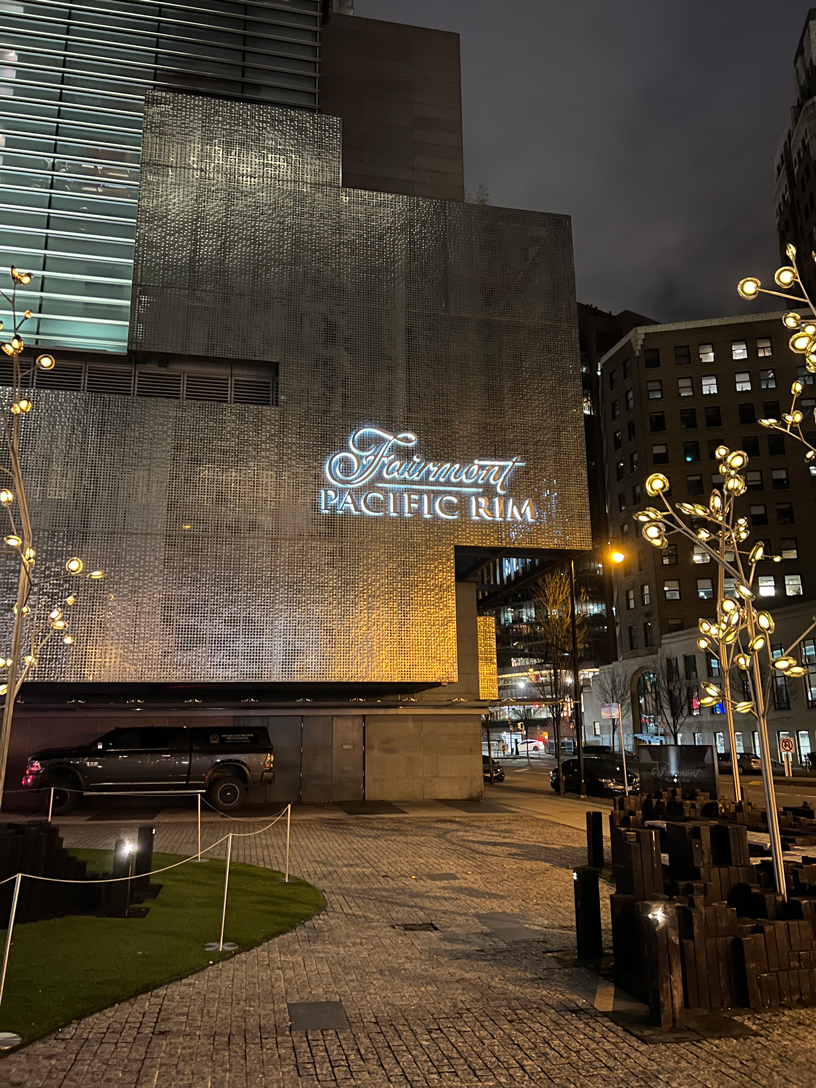
Fairmont Pacific Rim, the flagship Vancouver Fairmont property. Where technology and luxury meet, this property stands to gain the most from integrating AI into operations.
Before today’s digital age, ‘luxury’ hotels used to differentiate themselves (and their ratings) from competitors, through decreasing the effort required on the guest’s part. This was achieved at, or near, all of the touchpoints between the hotel and the guest during their experience at the property. Namely, assistance by a bellperson with unloading and carrying bags or suitcases up to the room; daily upkeep of the guest room by the housekeeper(s), room service/in-room dining options offered by a dedicated staff or butler; and sufficient staff presence to address the guest’s needs, when necessary, among other areas of service. Since then, leaps in technology such as the invention of the telephone have afforded this tier of hotels the ability to streamline their services provided, consequently enabling an expansion of offers to further distinguish themselves from their counterparts within the market. Now, the proverbial torch has been passed on to artificial intelligence (AI) technologies to enhance the guest experience by adjusting the services provided to align with the unique preferences and interests of each guest, all in an effort to create lifelong memories and loyal clients.
A study conducted by Al-Hyari et al. on the impact of AI on guest satisfaction from a hotel manager’s perspective found accord on the fact that AI and relevant automated technologies are inherently tied to the future of luxury hospitality, with the industry being most influenced by chatbots and virtual assistants, among other similar internet-based features (810). This stands to reason, considering just how much technology is already being used in luxury hotels to streamline operations for a seamless experience from the guest’s perspective. Moreover, nearly everyone with a smartphone and internet access has encountered the aforementioned at least once in some form. For example, when browsing specific hotel brand websites, like Hyatt, or search aggregators like Expedia, there is an option to request assistance regarding reservations and general questions via live chat with an agent or AI. Each interaction with these technologies provides the platform owners with anonymized user data upon which to determine trends in interests and preferences, thus allowing them to further tailor ads and suggestions to appropriately entice potential guests to book with the brand/property.
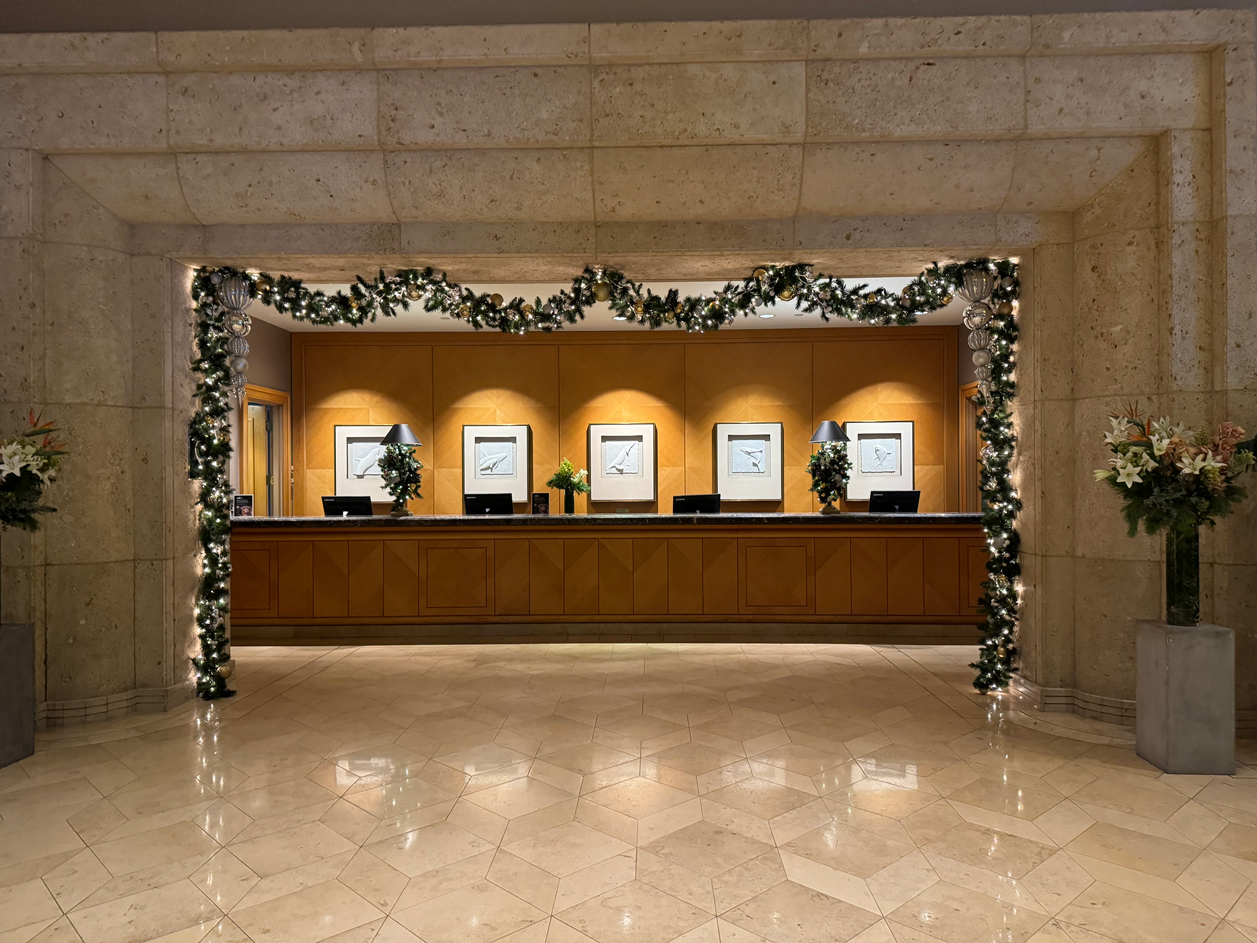
The front desk at Fairmont Waterfront. The computer monitors are evidence of technology being used in the guest experience, but the overall process is still controlled by human oversight.
There are, however, traditionalists who remain steadfast on their respective definitions of ‘luxury.’ World-renowned luxury hospitality brands know full well the importance of striking a fine balance between the presence of technologies like AI within hotel operations, and the degree to which the guest can easily observe said presence of technology during their stay with the hotel. In an interview I conducted in November, 2023, Jean-François Vary, current General Manager of Fairmont Le Château Frontenac and former General Manager of Fairmont Waterfront, gave the following response to the question: what could be holding back classic luxury hotel brands (Like Fairmont, Ritz-Carlton, and St. Regis) from embracing a new era of technology and integrating it into their operations?
I think it’s trying to find the right balance of where AI belongs in the guest experience, and what I mean by that is, you see a lot of places now where they’ve got these terminals [kiosks] you can utilize. But luxury guest experience has often been about creating an emotional connection with the guest, which seems to require a human connection. And just the feeling you get by interacting with someone, the smiles, etc., those are things that automated systems can’t replicate. That said, luxury is also trying to make things easy and efficient for people as well. And so, AI and technology can do that more efficiently and effectively than a human might. So, it’s trying to find the right balance of what’s the right technology and when it’s appropriate. Whether it’s to give the guest the option of one or the other, but really the biggest hurdle from a luxury perspective is really a human emotional connection. That happens between two humans.
Mr. Vary’s insight resonated with my personal experiences and interactions with the luxury hotel industry, both as a guest and an employee. In a world dominated by our presence online, and a future of society where virtual reality becomes the norm; I, like many others, seek experiences only a human can meaningfully provide. The infancy of generative AI technologies allows us to explore its capabilities from two points-of-view: the discerning and well-travelled guest, in pursuit of an experience tailored down to their most specific preferences and desires; and the staff in luxury hotels, seeking to fulfill this pursuit in a style that is seamless, effortless, and authentic.
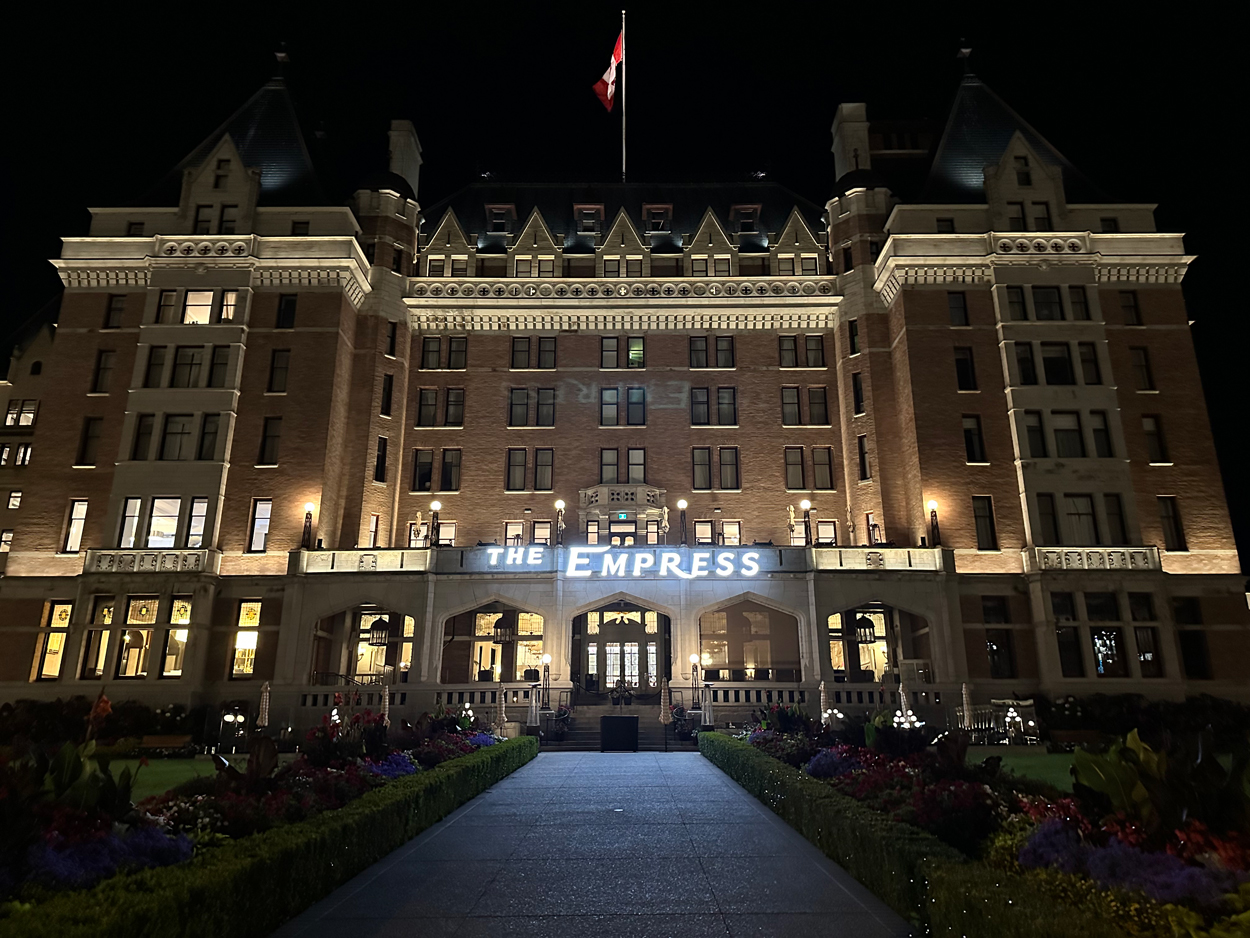
The harbour-facing facade of Fairmont Empress. A property that celebrated its 115th anniversary in 2023, the staff and clientele are ostensibly more traditionalist in values, therefore making this property and similar hotels most resistant to the arrival of AI and its integration into operations.
Consider, briefly, Maslow’s Hierarchy of Needs—a five-stage triangle that may be subdivided into fundamental and growth/development needs. During my time on the other side of service as an employee, I have observed Fairmont Waterfront’s clientele to be in a stage of their lives where fundamental needs have long been met, and they are now in search of ways to meet their growth and development needs—a task easier said than done. This is particularly evident in those who are retired from their careers and enjoying the fruits of their labour. Because of the age range of this demographic, it is entirely natural for these guests to be averse to change, especially with respect to technology. Therefore, the onus is on the hotel to efficiently integrate AI solutions in a manner that is invisible when considered from the guest’s perspective. When done properly, the guest notices a highly enhanced allure and perception of seamless luxury offered by the hotel, which meets the brand’s goal of ensuring that effort required on the part of the guest is reduced to a minimum. This in turn makes the guest feel pampered and well taken care of. They feel like they are at the centre of attention, and this propels them toward the very top of the Hierarchy: self-actualization. In other words, accomplishing the desire to be the best possible version of oneself.
Another aspect of the guest experience where the integration of AI technologies could prove to be invaluable is the booking process itself. With the myriad of brands present in the current market, the guest is now faced with the paradox of choice—too many available options leading consumers to make suboptimal choices, resulting in decreased levels of happiness and satisfaction. AI could immensely reduce the stress and headache associated with choosing the right type of accommodation for the guest’s needs. Mr. Vary had the following opinion on the interview question: How can the guest’s experience be further enhanced with AI; from booking through to checkout?
We’re seeing it already with our booking sites, where the system, through various cues, helps the guest. Because the simpler the process can be, the happier or more satisfied the guest is [going to] be. So, systems today are based on various cues that will help feed the guest information that will facilitate the booking process. The more the system gets to know the guest through their online search behaviours or whatever it may be, it provides them information based on that data collected. It makes the booking process more personalized, and better. For example, if the system sees a booking for a family, it will start feeding appropriate options for the guest. The guest doesn’t need to search for family rooms because the system already knows the booking is for two adults and two children of X age. The system would also start leading the guest down the path of “here’s some great things to do in Vancouver for a family” so those are great enhancements that, before, would require more searches. When booking a travel experience, the system should lead and guide you to make things as easy and smooth as possible. That would be great for the guests and great for the business as well because the guests will make purchases that they would otherwise not have made because they were not aware of it. These opportunities, say a family suite, where they were initially looking for just a guest room, well now it’s [going to] lead them to the right accommodation and perhaps the right amenities, the guest is [going to] have a better experience and the hotel is [going to] make more revenue as well. This is just an example of how, from a reservations perspective, there’s been a lot of enhancements. I can just imagine how much those are [going to] progress. That said, we have to be careful because there are a lot of companies shifting toward where AI answers the phone. As much as that can be thought to be an enhancement, and it is getting better, some of those systems can be frustrating as well. You just want to speak with somebody, right? There’s a lot of benefits but again we have to make sure that the systems we select are really in alignment with the experience level we can provide (2023).
Virtual assistants already gather this type of data through the use of cookies left on the user’s device each time they visit a website, but if AI can be leveraged to gather this data on a system level, with the results instantly accessible by hotel management, this then enables a level of personalization unparalleled in the luxury hotel industry today. The concept of predicting and addressing guest needs and issues before they even think about it would be made significantly easier from an employee’s perspective, and allow them to fine-tune their face-to-face interactions with the guest. If I, for example, were able to access the guest’s AI-gathered dining preferences to suggest certain menu items that would be more appealing to them, that could potentially increase revenue and the guest’s overall spend with the brand/property.
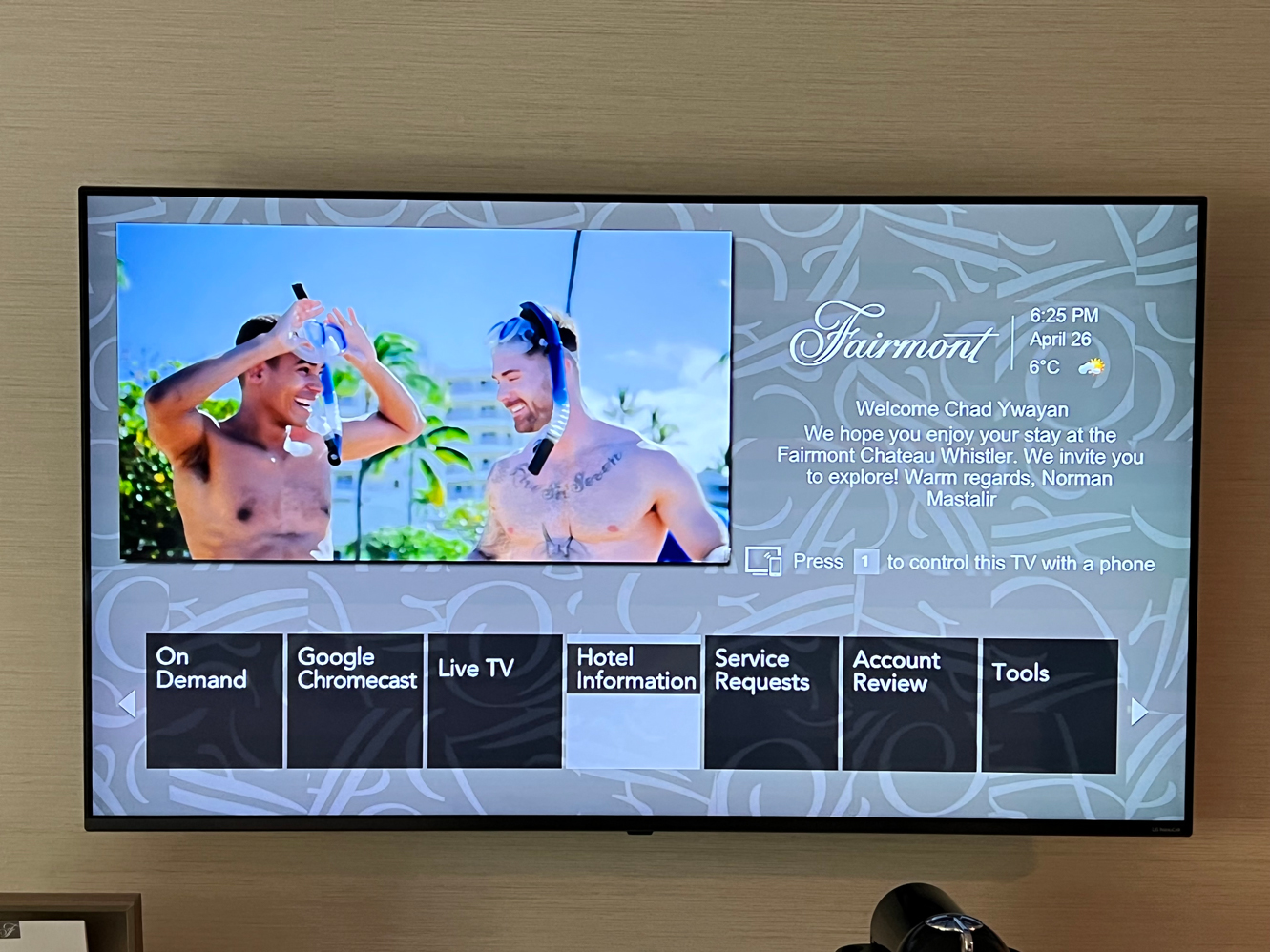
A personalized welcome screen I was greeted with during my stay at Fairmont Château Whistler back in 2022. Should in-room TVs be upgraded to include AI capabilities, this seemingly overlooked feature would see a massive rise in guest utilization.
Talent Acquisition and Management
Al-Hayri et al.’s study found similar agreement among participants with respect to the consideration needed for both people and AI to coexist harmoniously in the luxury hotel workplace (810). This parallel illustrates the need to ensure that AI augments, and does not usurp, the duties of human workers, maintaining the human connection highly valued by guests and staff alike. However, as with any matter regarding sweeping changes to the status quo, there is reasonable apprehension expressed by members of the workforce who are concerned that the overwhelming presence of technology will lead to a decline in human capital in favour of automated AI solutions. This concern extends to nearly all aspects of hotel operations, specifically Human Resources (HR), as this department could be most impacted by AI, should its integration be expanded to a greater degree.
Nearly two years since its mainstream introduction, questions have been raised about whether ChatGPT, with all its updates and enhancements, can replace human HR professionals. Most experts doubt this, pointing to the technology’s recent development. Elmohandes and Marghany’s exploratory study in 2023 evaluated ChatGPT’s suitability as a recruitment tool in the luxury hospitality sector, highlighting both the benefits and drawbacks for recruiters and job seekers (17). Despite scant research on its efficacy in recruitment, onboarding, and orientation, anecdotal evidence suggests that ChatGPT could proficiently manage the entire hiring cycle. It can automate various tasks, from creating job postings to sending rejection notices. For job seekers, ChatGPT provides a useful starting point for company research. However, caution is necessary, as a disclaimer highlights the possibility of errors and the importance of manual verification for accuracy (19). The notion that ChatGPT, in its current state, can completely fulfill HR roles is unfounded since it relies on pre-existing human-generated data and writings, which may include biases that can affect the output. The years 2023 and 2024 mark the start of an era of generative AI, not general AI, indicating that the technology has not yet reached a stage where it can mimic human abilities completely, necessitating ongoing human oversight. Misuse of ChatGPT by job applicants could complicate matters and cause major issues if they progress to an interview stage. Namely, the generation of resume and cover letter content that does not at all reflect the prior experience and skill set the applicant hopes to bring to their prospective company. Additionally, the voice or lack, thereof, in the generated text is often a dead giveaway to its artificial nature. As hiring processes typically conclude with, or at least include, in-person interactions, candidates must be prepared to verify the qualifications they list on their resumes and cover letters, as these documents are fair game and scrutinized during interviews. The current version of the software cannot produce a script for memorization that comes across as natural and convincing, instead being quite mechanical and disconnected.
Although AI can be a powerful tool useful for reshaping the full cycle hiring process, it must be mentioned that there are some aspects of this process that simply cannot be done by generative AI solutions at this time. A study conducted by Dimanche and Lo to explore the current state of the Canadian luxury hotel labour market, specifically the existing labour gaps that were only magnified during the COVID-19 pandemic, identified the following skill gaps: “ability to provide personalized [and anticipatory] service, emotional intelligence, creativity, professional presentation and communication, and aesthetic awareness” (2022). Moreover, the number of applicants possessing all the above skills is extremely low, and attitudes toward work and employment have irreversibly shifted during the pandemic, leading to choosy candidates who know their worth, and choosy hiring managers of luxury hotel companies who want to hire and retain only the best of the best. AI can readily be utilized by HR professionals to generate strategies on how to achieve staffing requirements, and may even offer perspectives that hiring managers would never have considered. In my opinion, none of the above skill gaps, save for professional communication and aesthetic awareness, can be fully addressed by AI. All can only be learned and demonstrated comprehensively by a human, especially emotional intelligence and creativity. It is evident that AI can only really be classified as a potentially useful, albeit seldomly unethical, tool to aid this facet of luxury hotel operations at present. If and when a time arises where the latter two are capable of being performed by AI is the time where society shifts from generative AI to general AI; a time, depending on whom one asks, is either uncomfortably soon, or far into the distant future.
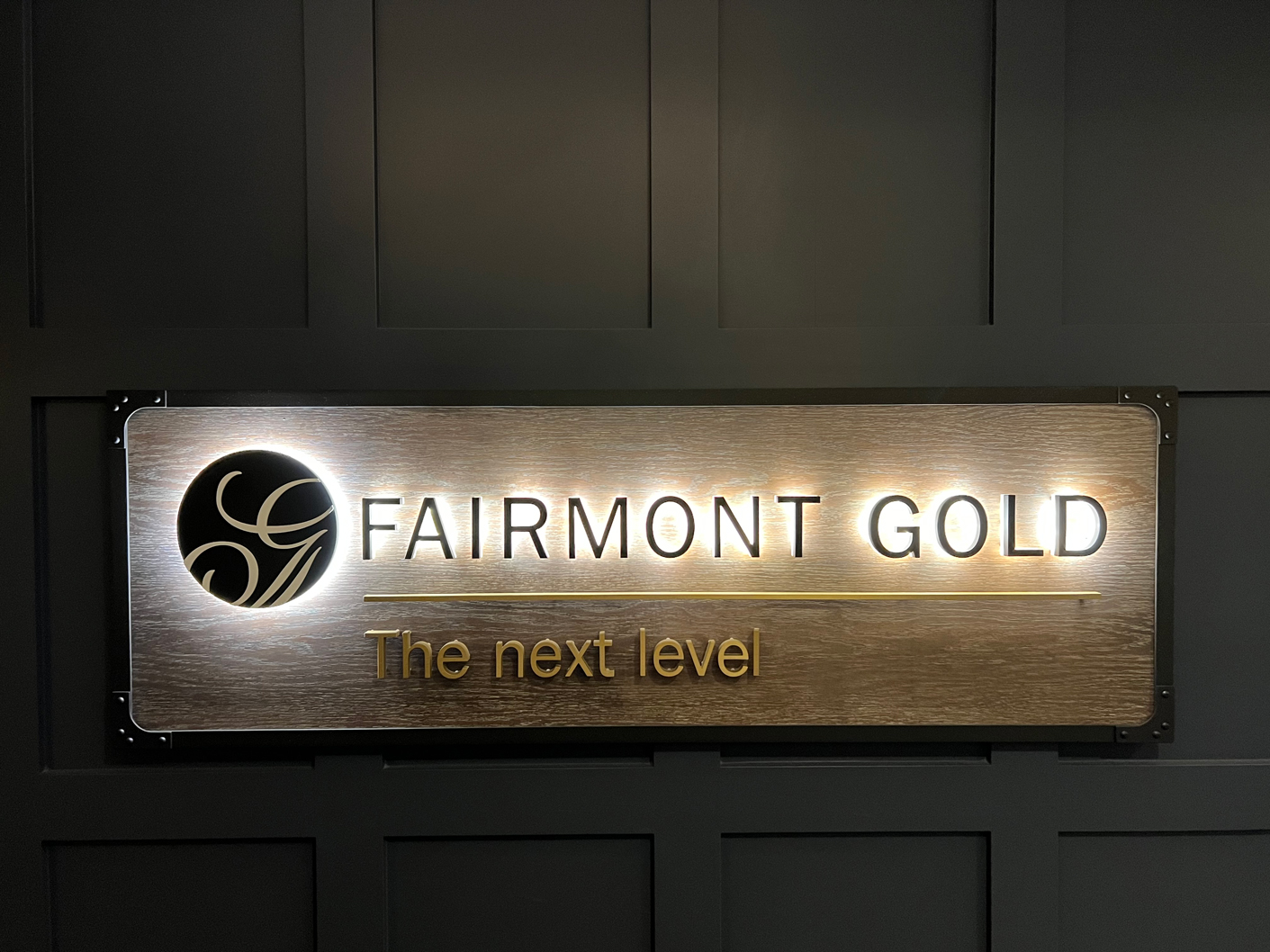
The sign outside the Fairmont Gold Lounge at Fairmont Château Whistler. This privileged and exclusive hotel-within-a-hotel experience would greatly benefit from AI solutions as the staff would be immensely more prepared to serve guest needs and create an experience with memories that will last a lifetime.
Conclusion
The burgeoning role of artificial intelligence (AI) in the luxury hospitality sector marks a revolutionary shift in operational dynamics, guest experience, and talent acquisition. This article explored how AI, while still in its nascent stages, is poised to redefine the future of luxury hospitality. The intersection of AI with luxury hotel operations, as demonstrated in this article, reveals a dual objective: enhancing customer satisfaction through tailored experiences and streamlining operational efficiency. AI’s potential to transform guest experiences in luxury hotels, as evidenced by the adoption of technologies in renowned brands like Fairmont and Ritz-Carlton, is immense. With the potential to be integrated so as to personalize room settings, optimize front desk and rooms division operations, and provide efficient and effective online assistance, AI is setting a new benchmark in customer service. However, this integration must be balanced with the human touch to ensure that guests do not feel alienated by overly mechanized interactions. Furthermore, the advent of AI tools like ChatGPT in talent management opens new possibilities for the recruitment process in luxury hospitality. These tools, while beneficial, need to be used judiciously, ensuring that the human element in HR remains predominant.
This article, drawing from academic insights and practical observations at Fairmont Waterfront, underscores that the key to successfully integrating AI lies in a balanced approach. Luxury hotels must navigate the fine line between technological advancement and the preservation of the personal, human-centric essence of hospitality. As AI continues to evolve, it offers a path forward for the luxury hospitality industry to innovate while remaining true to its core values of exceptional service and guest satisfaction.
References
Al-Hyari, Hadeel Sa’ad, et al. “The Impact of Artificial Intelligence (Ai) on Guest Satisfaction in Hotel Management: An Empirical Study of Luxury Hotels.” GeoJournal of Tourism & Geosites, vol. 48, Apr. 2023, pp. 810–19. EBSCOhost, https://doi.org/10.30892/gtg.482spl15-1081.
Dimanche, Frederic, and Katherine Lo. “The Elusive Search for Talent: Skill Gaps in the Canadian Luxury Hotel Sector.” Tourism & Hospitality (2673-5768), vol. 3, no. 1, Mar. 2022, pp. 31–46. EBSCOhost, https://doi.org/10.3390/tourhosp3010003.
Elmohandes, Nirmeen, and Mostafa Marghany. “Effective or Ineffective? Using ChatGPT for Staffing in the Hospitality Industry.” European Journal of Tourism Research, vol. 36, Nov. 2023, p. 3617. https://doi.org/10.54055/ejtr.v36i.3286.
Vary, Jean-François. Personal interview. 8 November 2023.
